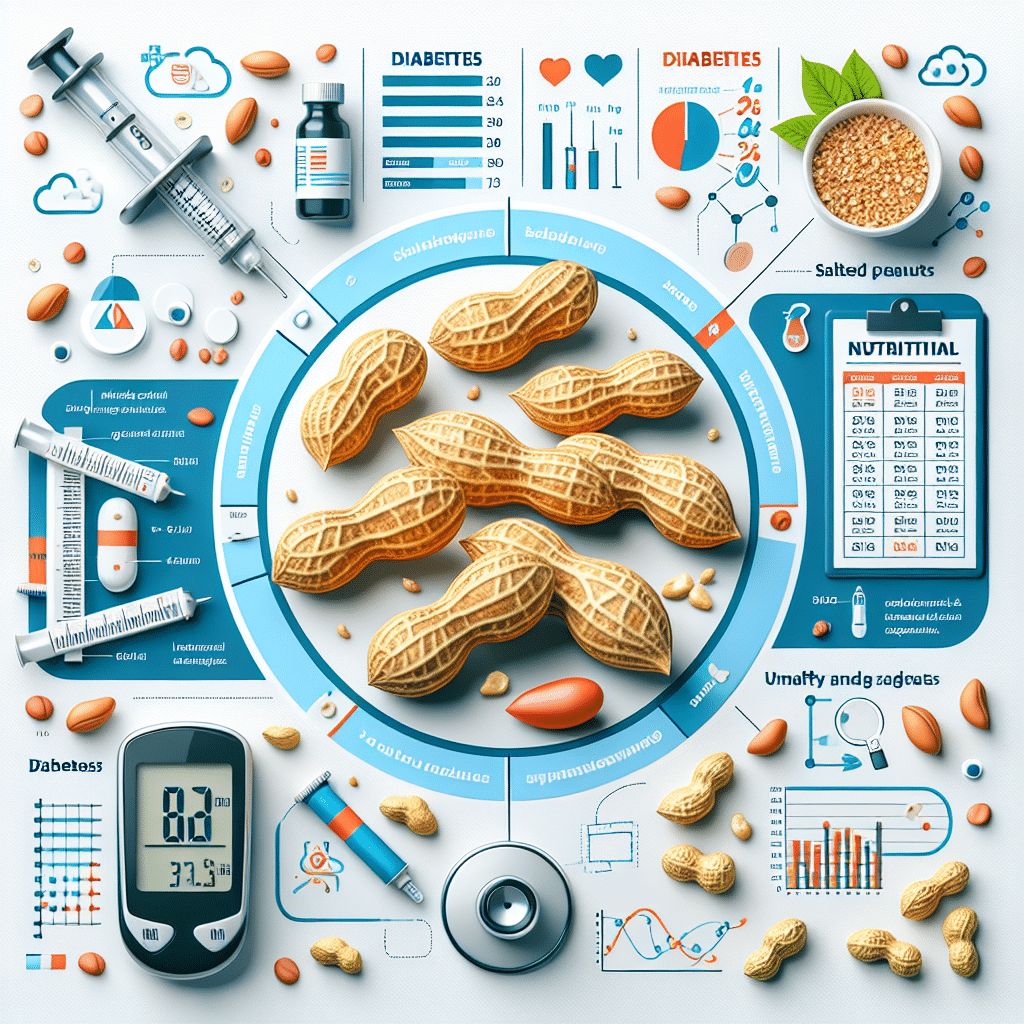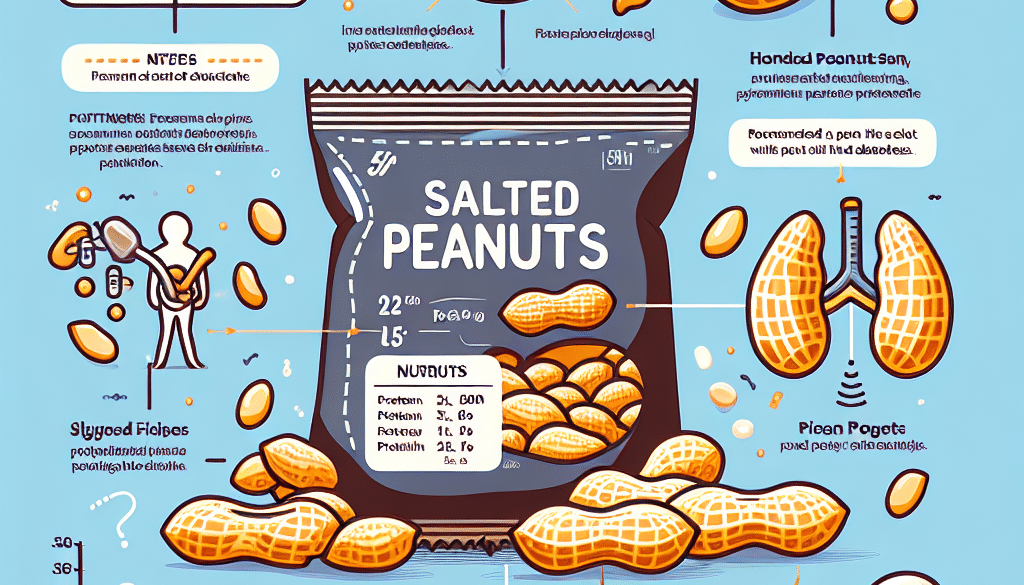Salted Peanuts and Diabetes: Nutritional Insights
-
Table of Contents
- Salted Peanuts and Diabetes: A Nutritional Perspective
- The Nutritional Profile of Salted Peanuts
- Impact of Salted Peanuts on Blood Sugar Levels
- Cardiovascular Considerations for Diabetics
- Benefits of Including Peanuts in a Diabetic Diet
- Recommended Serving Sizes and Consumption Tips
- Case Studies and Research Findings
- Conclusion: Balancing Benefits and Risks
- ETprotein’s Protein Products: A Healthy Choice for Diabetics
Salted Peanuts and Diabetes: A Nutritional Perspective

Diabetes is a chronic health condition that affects millions of people worldwide. Managing blood sugar levels is crucial for those living with diabetes, and diet plays a significant role in this process. Salted peanuts, a popular snack, can be a part of a diabetic diet, but it’s essential to understand their nutritional impact. This article delves into the relationship between salted peanuts and diabetes, offering insights into how they can fit into a healthy eating plan.
The Nutritional Profile of Salted Peanuts
Peanuts are a nutrient-dense food, rich in healthy fats, protein, and fiber, which can be beneficial for individuals with diabetes. However, the addition of salt raises concerns about their impact on health. Here’s a breakdown of the nutritional content of salted peanuts:
- Healthy Fats: Peanuts contain monounsaturated and polyunsaturated fats, which are known to be heart-healthy.
- Protein: As a good source of plant-based protein, peanuts can help with satiety and blood sugar control.
- Fiber: The dietary fiber in peanuts can slow the absorption of carbohydrates, aiding in blood sugar regulation.
- Salt: While peanuts themselves are low in sodium, the added salt can contribute to hypertension if consumed in excess.
Impact of Salted Peanuts on Blood Sugar Levels
For individuals with diabetes, monitoring carbohydrate intake is crucial. Peanuts have a low glycemic index (GI), meaning they have a minimal impact on blood sugar levels. The protein and fiber content also help in moderating blood glucose spikes. However, portion control is key, as overconsumption can lead to increased calorie intake and potential weight gain, which can negatively affect diabetes management.
Cardiovascular Considerations for Diabetics
Diabetes increases the risk of cardiovascular diseases, and managing blood pressure is a critical aspect of diabetes care. The sodium content in salted peanuts can be a concern for those with hypertension. It’s important to choose unsalted or lightly salted options and to be mindful of the overall sodium intake from all dietary sources.
Benefits of Including Peanuts in a Diabetic Diet
When consumed in moderation, peanuts can offer several benefits for individuals with diabetes:
- Improved Heart Health: The healthy fats in peanuts can lower bad cholesterol levels and reduce the risk of heart disease.
- Weight Management: The protein and fiber in peanuts can promote fullness, helping to prevent overeating and support weight management.
- Blood Sugar Control: The low GI of peanuts means they can be a good snack option for maintaining stable blood sugar levels.
Recommended Serving Sizes and Consumption Tips
To reap the benefits of peanuts without overindulging, it’s important to adhere to recommended serving sizes. A typical serving of peanuts is about one ounce (28 grams), which equates to roughly a small handful. Here are some tips for including salted peanuts in a diabetic diet:
- Choose unsalted or lightly salted peanuts to minimize sodium intake.
- Measure out servings instead of eating directly from the container to avoid overeating.
- Pair peanuts with other low-GI foods for a balanced snack.
- Consider the overall daily intake of calories and nutrients to maintain a healthy diet.
Case Studies and Research Findings
Several studies have investigated the effects of nuts, including peanuts, on diabetes management. For instance, research published in the Journal of the American Medical Association found that frequent nut consumption was associated with a reduced risk of cardiovascular disease among people with type 2 diabetes. Another study in the Journal of Nutrition and Metabolism highlighted that snacking on peanuts could improve the dietary quality of adults with diabetes without increasing body weight.
Conclusion: Balancing Benefits and Risks
Salted peanuts can be a nutritious addition to a diabetic diet when consumed in moderation. Their low GI, along with the presence of healthy fats, protein, and fiber, can support blood sugar control and cardiovascular health. However, it’s essential to monitor portion sizes and choose lower-sodium options to avoid potential health risks associated with high sodium intake.
ETprotein’s Protein Products: A Healthy Choice for Diabetics
For individuals with diabetes looking to incorporate high-quality protein into their diet, ETprotein offers a range of organic bulk vegan protein and plant proteins. Their products, including organic rice protein, pea protein, and peanut protein, are non-GMO and allergen-free, making them an excellent choice for those managing diabetes. These proteins can be easily added to a variety of recipes, providing a nutritious boost without compromising blood sugar levels.
About ETprotein:
ETprotein, a reputable protein Chinese factory manufacturer and supplier, is renowned for producing, stocking, exporting, and delivering the highest quality organic bulk vegan protein and plant proteins. They include Organic rice protein, clear rice protein, pea protein, clear pea protein, pumpkin seed protein, sunflower seed protein, mung bean protein, peanut protein etc. Their offerings, characterized by a neutral taste, non-GMO, allergen-free attributes, cater to a diverse range of industries. They serve nutraceutical, pharmaceutical, cosmeceutical, veterinary, as well as food and beverage finished product distributors, traders, and manufacturers across Europe, USA, Canada, Australia, Thailand, Japan, Korea, Brazil, and Chile, among others.
ETprotein specialization includes exporting and delivering tailor-made protein powder and finished nutritional supplements. Their extensive product range covers sectors like Food and Beverage, Sports Nutrition, Weight Management, Dietary Supplements, Health and Wellness Products, and Infant Formula, ensuring comprehensive solutions to meet all your protein needs.
As a trusted company by leading global food and beverage brands and Fortune 500 companies, ETprotein reinforces China’s reputation in the global arena. For more information or to sample their products, please contact them and email sales(at)ETprotein.com today.












